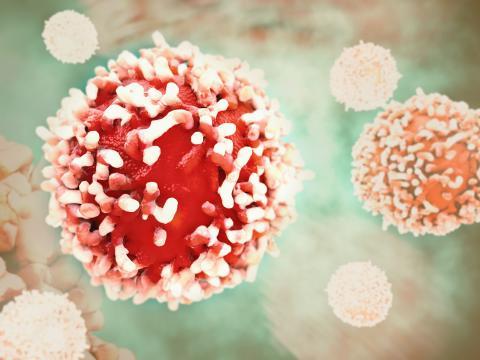Incidence of colon cancer continues to rise in young people in many high-income countries, although not in Spain
A team of researchers has analyzed data from the World Health Organization to estimate the incidence of colorectal cancer in 50 countries around the world. Their conclusions, based on records up to 2017, are that in most high-income countries its incidence continues to increase in young people (under 50 years of age). This increase, however, is not observed in Spain. The results are published in the journal The Lancet Oncology.

Borràs- Colon (EN)
Josep M. Borràs
Scientific coordinator of the National Health System Cancer Strategy, director of the Catalan Oncology Plan and Professor of Preventive Medicine and Public Health at the University of Barcelona
It is a very interesting and high quality article. It situates very well how the much debated topic is in its real quantitative framework in different countries. The strong aspects of the article are that it is based on population incidence data in quality cancer registries and with a sufficient period of time in the analysis. The data observed confirm that this increase in cases is not observed in Spain, confirming previous observations.
An important fact is that Spain is among the countries with the highest incidence in the world in people over 50 years of age, behind only the Netherlands, Japan and Denmark.
As to why the increase [in young people] that is observed in other countries (but not in all of them, far from it) is not observed in Spain, it is difficult to propose an explanation. One explanation would be that our incidence will increase in the coming years and there is simply a time lag. Clearly this phenomenon affects population cohorts born later than the 50s/60s of the last century, and it is difficult to think that changes in diet and physical exercise are so different from other countries around us. Therefore, we should be vigilant in case the trend finally changes in the future and try to promote healthy habits that we have been progressively losing, such as eating healthily, without being overweight or obese. And doing moderate but constant physical exercise.
Marcos - Colon (EN)
Rafael Marcos Gragera
Epidemiologist at the Catalan Institute of Oncology and professor of medicine at the University of Girona
Aina Romaguera
Research technician at the Girona Cancer Epidemiology and Registry Unit of the Catalan Institute of Oncology-Oncology Master Plan
The study uses the World Health Organization-IARC database “Cancer Incidence in Five Continents Plus”, which is a database where different registries from around the world participate. This makes the number of cases high, thus increasing the statistical power.
The study presented on the latest trends in the incidence of colorectal cancer in young people shows an increase in incidence in some countries (in 17 countries out of the 50 studied).
The methodology is correct. These studies are useful and necessary for long-term evaluation of chronic disease control.
According to data on cancer estimates in Spain prepared by REDECAN, 60,000 cases of colorectal cancer will be diagnosed in Spain in 2024, being the most frequent tumor in men and women.
According to the data of this study, Spain does not show an increase in the incidence of colorectal cancer in young people.
The study seeks to investigate the incidence and trend of colorectal cancer incidence, comparing age groups and dividing countries into high, medium and low development regions. From these results, risk factors associated with the lifestyle of the countries could be hypothesized and their trends compared.
The results of this study are in line with other recently published studies assessing mortality trends.
These coauthors comment that while mortality from common cancers has generally declined over the past three decades, mortality from colorectal cancer has increased in some countries, highlighting the need to control the obesity epidemic and implement surveillance strategies targeting young populations.
There are possible explanations for this increase in colorectal cancer incidence and mortality in young people. Risk factors that have undergone changes in recent decades and that may affect young people include mainly environmental factors, such as obesity in adolescence, prolonged sedentary behavior, and dietary factors that are now increasingly consumed during childhood and adolescence, such as sugary drinks, red and processed meats, and Western diets.
Unfortunately, observational studies offer only a superficial view of our understanding of the biology of colorectal cancers in young people. Robust epidemiological studies with validated dietary and lifestyle data collected prospectively and repeated over a lifetime (the exposome) are crucial. These studies are vitally important to accurately measure exposures, their potential confounders, and the time and latency window of cancer related to the risk factors involved.
In addition, observed incidence data are up to 2017 in most countries, these incidence trends will need to be monitored with more recent data.
Pablo -Colon
Pablo Fernández Navarro
Scientific researcher at the Cancer and Environmental Epidemiology Unit of the National Epidemiology Centre, Carlos III Health Institute, member of CIBERESP and co-coordinator of the Cancer Epidemiological Surveillance Sub-programme - VICA of CIBERESP
Colorectal cancer (CRC) is the third most common type of cancer worldwide (more than 1.9 million cases were diagnosed in 2022) and is the second most common cause of cancer death (causing more than 900,000 deaths per year), despite the existence of effective screening techniques that could reduce the number of deaths from this disease. Monitoring the situation of this cancer is therefore crucial to be able to control the impact of this disease on the population.
Previous studies had already observed that the incidence of this cancer was increasing among young adults (<50 years) in several high-income countries (USA, Canada, Australia...) (1%-4% per year), and that it showed heterogeneous trends in Europe. The work of Hyuna Sung, et al., which is a well-prepared study, presents a more up-to-date view in many cases and contemplates a wide range of regions of the world, which makes it easier to compare different types of situations and to generate hypotheses on the causes that may be explaining the observed trends.
In this regard, CRC in young adults is partly due to hereditary cancer syndromes, but most cases are sporadic. The possible reasons for the increases in incidence seen in this group, which could be related to the increasing prevalence of obesity, lack of exercise, and dietary factors such as alcohol and processed meat, are currently unknown. In addition, given that urbanization and pollution have also been associated with the overall increase in incidence, these factors could be playing some role in the trends in young adults. Studying the epidemiology of CRC may have many practical implications, such as establishing the age of screening initiation. In this regard, the U.S. findings supported the American Cancer Society in recommending initiation of screening at 45 years of age.
Despite the limitations highlighted by the authors, such as the under-representation of developing countries or the lack of national coverage in the incidence data of some countries (as in Spain), and the fact that the period of time analyzed does not allow us to obtain a completely updated view of the situation, the study represents a great integrative effort that allows us, on the one hand, to obtain a good overview of both the situation of the evolution of colorectal cancer in young adults, and the possibility of identifying in which regions a greater effort is required in the collection of information.
In Spain there is no increase in the incidence of CRC in young adults. This finding, which is not novel, could be explained by the lack of exposure to the factors already discussed. It should be noted that both the Spanish Network of Cancer Registries (REDECAN) and the Ministry of Health, together with the autonomous communities and the National Epidemiology Center (ISCIII) carry out activities to obtain reliable, updated and quality information to monitor the incidence of cancer in young adults. In addition, the Spanish Society of Epidemiology has also echoed the importance of the study of cancer in this group, setting up a spontaneous round table at this year's congress with the title “Epidemiología del cáncer en población adulta joven/Epidemiologia do cancro na população adulta joven” (Epidemiology of cancer in young adults/Epidemiology of cancer in young adults).
Isabel Portillo - cáncer colon jóvenes EN
Isabel Portillo
Screening Coordinator at Osakidetza -Basque Health Service, researcher in the Cancer Biomarkers group at the Biobizkaia Health Research Institute, and secretary of the Board of Directors of the Spanish Epidemiology Society
It is an exploratory study. The most important limitation is the comparability of registers and series. It is not a systematic review and the quality of these sources is not analysed. The incidence of these groups is very low and the causes of their increase are certainly not well known; 5% may be related to genetic factors.
At the methodological level I consider that it should be more rigorous given the data sources. In Globocan, CRC incidence and mortality, as the article says, tends to decrease in the population screened 50-74 (which is uneven in different countries).
Further research is needed, especially on risk factors that are increasing (tobacco, obesity, alcohol, consumption of red meat and processed products...), which mainly affect people with a high level of deprivation.
[In terms of limitations] These have been taken into account. Above all because the quality of the registers is the greatest impediment to making comparisons.
Sung et al.
- Research article
- Peer reviewed
- Observational study
- People



